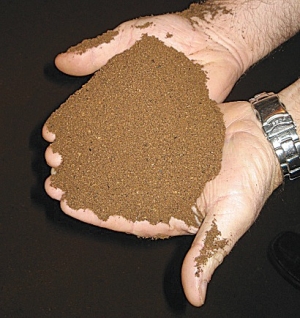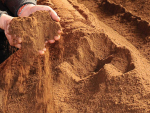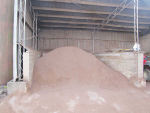DON’T SAY we didn’t warn you, say the authors of a damning report on the PKE supply chain. Their warning comes after the Ministry for Primary Industry (MPI) said it had no concerns about Malaysian imports into New Zealand.
Having visited two Malaysia PKE mills last September, Federated Farmers grain executive members David Clark and Colin Mackinnon filed a report with MPI detailing what they believe are serious biosecurity risks posed by PKE imports (Rural News, November 4).
MPI last week issued a statement that Malaysian PKE meets New Zealand’s import standards and that Malaysian officials confirm no palm kernel expeller (PKE) has been exported to New Zealand from the processing mill Clark and Mackinnon had concerns about.
However, Clark and Mackinnon have slammed MPI’s response as: “disappointing but expected.”
That mill was one of two they visited and in an area where there’d recently been a foot and mouth outbreak and while birds and other animals could obviously access PKE post-processing. However, as far as the mill was concerned, it met all the standards for exports.
MPI director plants, food and environment, Peter Thomson, says the ministry has reviewed all the documentation for PKE shipments from Malaysia since 2011 and met Malaysian officials to ensure full understanding of New Zealand’s concerns.
“MPI officials will also visit Malaysian production mills in May this year to ensure each step along the supply chain is being correctly adhered to in accordance with New Zealand’s Import Health Standard.
“Malaysian officials are also carrying out their own investigation to ensure they are adhering to New Zealand’s requirements.”
Thomson says PKE for import to New Zealand must be processed in palm-only plants to remove the possibility of contamination from other products, and there are “stringent controls all along the supply chain.” Documentation must attest that handling, storage and inspections post-production and pre-shipping are correctly managed; also, that PKE was heated to 85oC, a temperature at which the foot and mouth virus cannot survive, and every shipment is fumigated.
“From our understanding of the export supply chain, I do not see how MPI can be certain that PKE did not come to New Zealand from plants such as the one we visited because industry practice is to sell PKE to commodity traders who consolidate [PKE consignments] at the port for bulk export,” Clark told Rural News.
“We all accept that when the PKE is expelled from the screw press the product is clean.
“It is the storage and supply chain from then on that is the source of contaminants. To rely on this heat treatment for biosecurity purposes is completely flawed as it occurs some weeks or months prior to export.”
Clark says he considers the report puts the dairy industry, Ministry and government “on notice”.
“In my view there are clear failings in the import process for PKE. It is now up to the dairy industry and government to decide if they wish to learn lessons from the kiwifruit / PSA tragedy.”



















